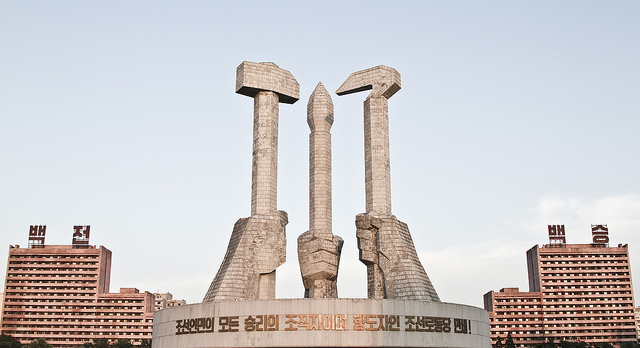
In light of the execution of North Korea’s second most powerful man and Kim Jong-un’s step-uncle, descriptions of North Korea as ‘irrational’ have resurfaced.
While ‘irrationality’ is an easy label for a situation not completely understood by the outside world, it doesn’t accurately describe North Korea’s leadership. North Korea’s actions—while unpredictable and apparently chaotic—result from sound strategy according to desired ends that the DPRK seeks, with the limited means available to it. North Korea has few cards but plays them well.
Relying on Robert Mandel’s definition of irrational activity as ‘a decision’s incompatibility with policy goals, prevailing consensus, or preferred outcome’, Ulv Hanssen on East Asia Forum observes: ‘one is often left with few other alternatives than to explain North Korean decision-making as irrational.’ Hanssen notes that the recent North Korean missile launch, which rescinded a deal for food aid, is behaviour so far removed from sound logical policy that irrationality remains the only appropriate explanation.
To draw this conclusion using this definition is faulty and shortsighted. As Rod Lyon has regularly highlighted, it’s an error to assume knowledge of North Korean ‘policy goals’, and inaccurate to assume that policy decisions made by North Korea are even attempted through ‘consensus’. Furthermore, it cannot be clear that the missile launch failed to achieve ‘preferred outcomes’. Time and time again the North Korean Government has prioritised regime preservation over civil welfare. The error in this assessment is based on the cognitive bias known as ‘mirroring‘. Through the eyes of a Western policymaker, the release of an untargeted rocket which nullifies a food aid deal within a malnourished country seems completely unfounded, reckless and counterproductive. This interpretation is persuasive because of how contradictory it seems when compared with Western liberal democratic thinking. But the DPRK—a totalitarian regime—has a completely separate agenda to the nation states that western theorists would label ‘typical’. Securing humanitarian aid is a secondary goal to maintaining a dangerous and unpredictable image in the interest of regime survival. Despite the continued demise of its citizens, the missile launch could be another calculated compromise by the DPRK.
Comparable to the extreme and unpredictable nature of North Korean foreign policy is Richard Nixon’s Madman theory, whereby the appearance of irrationality is used to neutralise conventional deterrence. While Nixon is a famous example of the Madman theory, the US didn’t possess a strategic culture that would nurture it. As a leader of a politically transparent superpower, Nixon was a leader ultimately bound by democratic accountability. He had to negotiate international relations with the Soviet Union as well as satisfy a conservative congress and his public, while under the eye of a watchful media. For a country like the US, the image of a ‘madman’ president could only go so far.
On the other hand, North Korea is far better suited to this approach. Remaining mostly estranged from the global economy or community, North Korea is able to control its aggressive ‘madman’ image from a hidden internal political structure. Its leaders are well placed to carry out acts of eccentric aggression before withdrawing from international view and accountability. In conjunction with a valid nuclear threat on key western targets (Seoul and Guam) the Kim Dynasty can effectively continue its regime with authoritarian internal control.
With limited regional influence and minimal power projection, spontaneous acts of unpredictable aggression remain the preferred tactics of the Kim Dynasty. Kim Jong-un still has to prove himself as a military leader and unwavering dictator. Along with his inherited title will come pressure to continue to dictate policy on the front foot. As long as he’s leader, North Korea will continue its method of a strategically aggressive and internationally reclusive attitude in order to maintain regime legitimacy. Despite mass violations of international law, norms and human rights the Kim Dynasty has used this asymmetrical approach toward international relations to avoid battles it cannot win, whilst simultaneously maintaining independence. Sixty years of regime supremacy is a product of effective strategy, not a by-product of irrationality.
Elliot McBride is a graduate of the Strategic & Defence Studies Centre at the Australian National University. Image courtesy of Flickr user Gabriel Britto.

